六年级英语时态综合复习123
PEP六年级英语下册小学时态总复习

②实义动词: 肯定句:主语 + 动词过去式 +其它. I watched TV last night.
否定句:主语+ didn't +动词原形 +其它. I didn't watch TV last night. 一般疑问句:Did +主语+动词原形+其他? Did you watch TV last night?
my mother
read books
every morning
My mother reads books every morning. My mother doesn't read books every morning. Does your mother read books every morning?
5. He often ____(have) dinner at home. has 6. John and Mike ___(be) in Class One. are
7. We don't _________(not watch) TV on watch
Monday.
8. Nick doesn't ________(not go) to the zoo go
on Sunday. 9. ____ they ___(like) the World Cup? Do like
10. ______ your parents _______(read) Do read
newspapers every day? 11. The girl _________(teach) us English teaches on Sundays. 12. She and I ________(go) for a walk go
六年级英语知识点归纳时态

六年级英语知识点归纳时态时态是语法中非常重要的一个概念,它用来表达动作或状态发生的时间。
在六年级英语学习中,时态的掌握对于学生的英语表达能力和理解能力有着至关重要的影响。
下面将对六年级英语中常用的时态进行归纳总结,帮助学生更好地理解和运用时态。
一、一般现在时(Simple Present Tense)一般现在时表示经常性、习惯性或普遍性的动作或状态。
在句子中,一般现在时的谓语动词要用原形。
1. 构成:主语 + 动词原形(第三人称单数要加s/es)例如:- He goes to school by bus every day.- They play football after school.2. 用法:- 表示习惯或常规动作:I brush my teeth every night.- 表示客观真理:The sun rises in the east.- 表示定时活动:The train leaves at 9 o'clock.二、一般过去时(Simple Past Tense)一般过去时表示过去某个时间发生的动作或状态。
在句子中,一般过去时的谓语动词需要加上过去式。
1. 构成:主语 + 动词过去式例如:- I watched a movie yesterday.- He played basketball with his friends last week.2. 用法:- 表示过去某个时间发生的动作:She visited her grandparents last Sunday.- 表示过去某段时间的状态:We lived in that house for ten years.三、一般将来时(Simple Future Tense)一般将来时表示将来某个时间将要发生的动作或状态。
在句子中,一般将来时的谓语动词需要使用情态动词“will”。
1. 构成:主语 + will + 动词原形例如:- She will go to the park tomorrow.- We will have a picnic next Sunday.2. 用法:- 表示将来的决定、打算或意愿:I will help you with your homework.- 表示预测或打算:It will rain tomorrow.四、现在进行时(Present Continuous Tense)现在进行时表示正在进行的动作或状态。
六年级上册一二单元英语知识点总结

六年级上册一二单元英语知识点总结一、语法知识点总结1. 动词时态六年级英语学习的时态主要包括一般现在时、一般过去时和一般将来时。
在学习一般现在时时,学生需要掌握动词第三人称单数的变化规则,以及可用于表示时间状况的频率副词;在学习一般过去时时,需了解动词过去式的构成方式,并能正确使用一般过去时中的时间状况词;在学习一般将来时时,需要学习情态动词“will”和“be going to”的用法,以及时间状况词的运用。
2. 形容词和副词比较级学生需要掌握形容词和副词的比较级构成规则,以及在实际应用中的使用技巧。
3. 名词单复数在六年级英语学习中,学生需要掌握名词单数变复数的规则,以及不规则变化的名词单复数形式。
4. 介词的使用学生需要掌握介词在句子中的作用和用法,包括表示时间、地点、方式等。
5. 定冠词和不定冠词的用法学生需要学会正确使用定冠词“the”和不定冠词“a/an”,并理解它们的含义和用法。
6. 句子的语序学生需要掌握英语句子的基本语序,进行正确的句子构成和翻译。
二、词汇知识点总结1. 需要学习并掌握的基本词汇:人称代词、冠词、名词、动词、形容词、副词、介词、数词等基础词汇,构建语言基础。
2. 动词过去式和过去分词的辨认和运用学生需要掌握动词的过去式和过去分词在句子中的使用,以及一些不规则动词过去式的变化形式。
3. 颜色、服装、家居等日常生活词汇学生需要学会用英语描述颜色、服装、家居等日常生活中的用词,丰富词汇量。
4. 时间、天气、季节等相关词汇学生需要掌握有关时间、天气、季节等词汇,能够用英语表达日期、天气状况和季节变化。
三、阅读知识点总结1. 阅读理解学生需要掌握阅读理解中的做题技巧,包括提取关键信息、推断含义、理解上下文等。
2. 词汇理解学生需要通过阅读来积累词汇,理解词汇在句子和段落中的使用,提升词汇量和语感。
3. 看图写话在阅读中,学生需要学会通过图片来进行简单的写作,进行故事情节串联,提高语言表达能力。
六年级英语总复习(时态-语法)
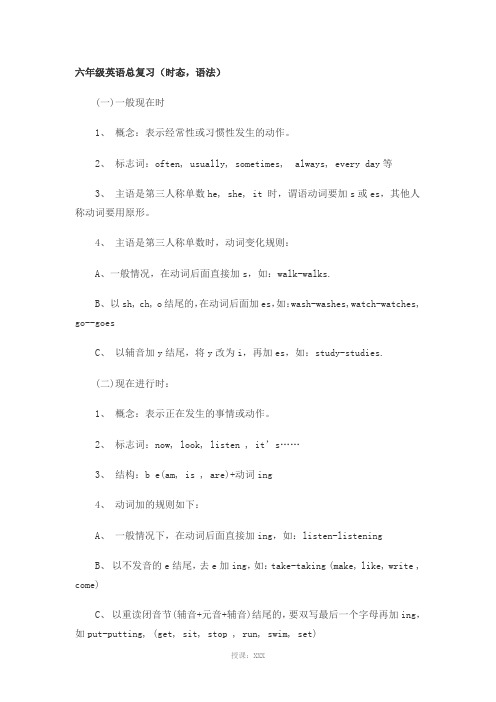
六年级英语总复习(时态,语法)(一)一般现在时1、概念:表示经常性或习惯性发生的动作。
2、标志词:often, usually, sometimes, always, every day等3、主语是第三人称单数he, she, it 时,谓语动词要加s或es,其他人称动词要用原形。
4、主语是第三人称单数时,动词变化规则:A、一般情况,在动词后面直接加s,如:walk-walks.B、以sh, ch, o结尾的,在动词后面加es,如:wash-washes,watch-watches, go--goesC、以辅音加y结尾,将y改为i,再加es,如:study-studies.(二)现在进行时:1、概念:表示正在发生的事情或动作。
2、标志词:now, look, listen , it’s……3、结构:b e(am, is , are)+动词ing4、动词加的规则如下:A、一般情况下,在动词后面直接加ing,如:listen-listeningB、以不发音的e结尾,去e加ing,如:take-taking (make, like, write , come)C、以重读闭音节(辅音+元音+辅音)结尾的,要双写最后一个字母再加ing,如put-putting, (get, sit, stop , run, swim, set)但:see-seeing, eat –eating.(三)一般将来时:1、概念:表示将要发生的事或打算,计划要做的事。
2、标志词:this weekend, next Monday, tomorrow, in seven years’ time3、结构:be(am, is , are) going to +动词原形或者 Will+动词原形如:I am going to take a trip next week.4、否定句:be+not going to +动词原形或者 Will+not(等于won’t)+动词原形(四)一般过去时:1、概念:表示在过去的时间里所发生的事或动作。
人教版六年级上册知识点归纳时态和语态的综合复习

人教版六年级上册知识点归纳时态和语态的综合复习时态和语态是语法中的重要概念,在学习语文的过程中,我们需要对时态和语态进行深入的理解和掌握。
本文将综合复习人教版六年级上册中的时态和语态知识点,帮助同学们更好地掌握这一内容。
一、时态时态是表示动作或状态发生的时间的一种形式。
英语中常见的时态有一般现在时、一般过去时、一般将来时等。
下面将详细介绍这几种时态的用法和构成。
1.一般现在时(Simple Present Tense)一般现在时用来表示经常性、习惯性的动作,或者客观事实。
它的构成一般是主语 + 动词原形。
例如:I often go to the park on weekends.He doesn't like playing football.2.一般过去时(Simple Past Tense)一般过去时用来表示过去发生的动作或状态。
它的构成一般是主语+ 动词过去式。
例如:She watched a movie last night.They didn't go to the party.3.一般将来时(Simple Future Tense)一般将来时用来表示将来某个时间会发生的动作或状态。
它的构成一般是主语 + will + 动词原形。
例如:I will visit my grandparents tomorrow.They won't be late for the meeting.二、语态语态是表示动作的主语与动作之间的关系的一种形式。
英语中常见的语态有主动语态和被动语态。
下面将详细介绍这两种语态的用法和构成。
1.主动语态(Active Voice)主动语态表示主语是动作的执行者。
它的构成一般是主语 + 动词原形。
例如:She sings a song in the concert.They eat lunch at 12 o'clock.2.被动语态(Passive Voice)被动语态表示主语是动作的承受者。
六年级时态总复习
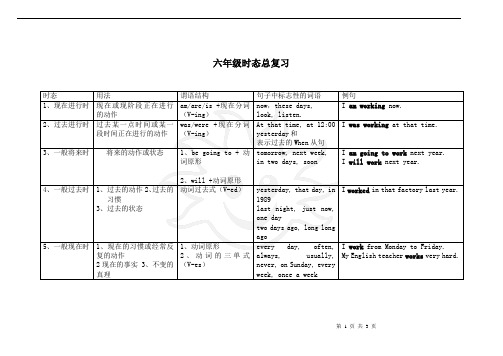
六年级时态总复习时态用法谓语结构句子中标志性的词语例句1、现在进行时现在或现阶段正在进行的动作am/are/is +现在分词(V-ing)now,these days,look, listen.I am working now.2、过去进行时过去某一点时间或某一段时间正在进行的动作was/were +现在分词(V-ing)At that time, at 12:00yesterday和表示过去的When从句I was working at that time.3、一般将来时将来的动作或状态1、be going to + 动词原形2、will +动词原形tomorrow, next week,in two days, soonI am going to work next year.I will work next year.4、一般过去时1、过去的动作2、过去的习惯3、过去的状态动词过去式(V-ed)yesterday, that day, in1989last night, just now,one daytwo days ago, long longagoI worked in that factory last year.5、一般现在时1、现在的习惯或经常反复的动作2现在的事实 3、不变的真理1、动词原形2、动词的三单式(V-es)every day, often,always, usually,never, on Sunday, everyweek, once a weekI work from Monday to Friday.My English teacher works very hard.一般过去时与过去进行时的区别侧重点不同结构不同时间状语不同 例句 一般过去时强调动作已经完成。
1. be 动词的过去式2. 行为动词的过去式3. 情态动词的过去式+动词原形笼统的时间: yesterday, in 1989, last night, just now, two days ago, 1. I was ten last year.2. Tim helped his mother this morning.3. John could ride a bike last year.过去进行时强调在过去的某个时间里动作正在进行。
六年级英语时态总复习
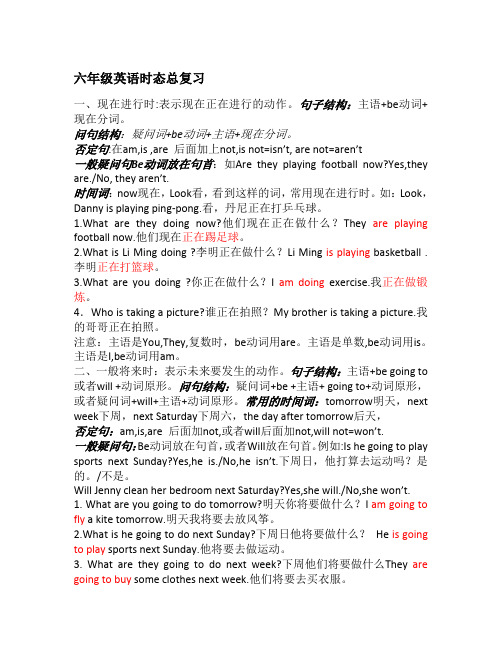
六年级英语时态总复习一、现在进行时:表示现在正在进行的动作。
句子结构:主语+be动词+现在分词。
问句结构:疑问词+be动词+主语+现在分词。
否定句:在am,is ,are 后面加上not,is not=isn’t, are not=aren’t一般疑问句Be动词放在句首:如Are they playing football now?Yes,they are./No, they aren’t.时间词:now现在,Look看,看到这样的词,常用现在进行时。
如:Look,Danny is playing ping-pong.看,丹尼正在打乒乓球。
1.What are they doing now?他们现在正在做什么?They are playing football now.他们现在正在踢足球。
2.What is Li Ming doing ?李明正在做什么?Li Ming is playing basketball .李明正在打篮球。
3.What are you doing ?你正在做什么?I am doing exercise.我正在做锻炼。
4.Who is taking a picture?谁正在拍照?My brother is taking a picture.我的哥哥正在拍照。
注意:主语是You,They,复数时,be动词用are。
主语是单数,be动词用is。
主语是I,be动词用am。
二、一般将来时:表示未来要发生的动作。
句子结构:主语+be going to 或者will +动词原形。
问句结构:疑问词+be +主语+ going to+动词原形,或者疑问词+will+主语+动词原形。
常用的时间词:tomorrow明天,next week下周,next Saturday下周六,the day after tomorrow后天,否定句:am,is,are 后面加not,或者will后面加not,will not=won’t.一般疑问句:Be动词放在句首,或者Will放在句首。
六年级英语时态整理知识点
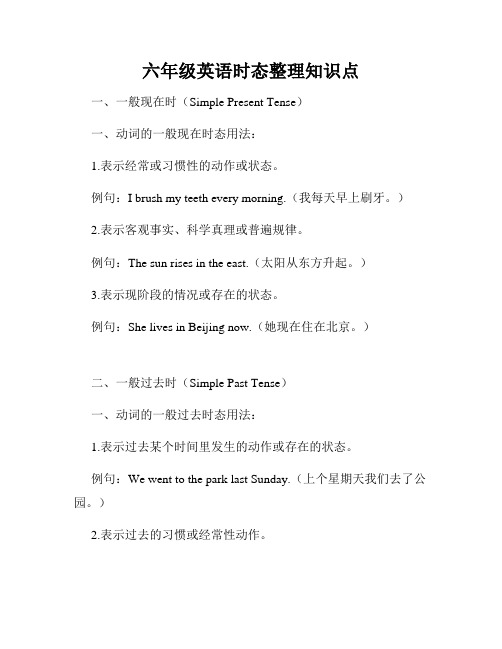
六年级英语时态整理知识点一、一般现在时(Simple Present Tense)一、动词的一般现在时态用法:1.表示经常或习惯性的动作或状态。
例句:I brush my teeth every morning.(我每天早上刷牙。
)2.表示客观事实、科学真理或普遍规律。
例句:The sun rises in the east.(太阳从东方升起。
)3.表示现阶段的情况或存在的状态。
例句:She lives in Beijing now.(她现在住在北京。
)二、一般过去时(Simple Past Tense)一、动词的一般过去时态用法:1.表示过去某个时间里发生的动作或存在的状态。
例句:We went to the park last Sunday.(上个星期天我们去了公园。
)2.表示过去的习惯或经常性动作。
例句:He always played football when he was young.(他年轻时总是踢足球。
)三、一般将来时(Simple Future Tense)一、动词的一般将来时态用法:1.表示将来某个时间内将要发生的动作或存在的状态。
例句:I will go to the beach next weekend.(下周末我会去海滩。
)2.表示将来的打算、意图或预测。
例句:She is going to be a doctor in the future.(她将来会成为一名医生。
)四、现在进行时(Present Continuous Tense)一、动词的现在进行时态用法:1.表示现在进行的动作。
例句:I am studying for the exam at the moment.(我正在复习考试。
)2.表示现阶段的变化、发展或趋势。
例句:The population of the city is increasing rapidly.(这个城市的人口正在迅速增长。
)五、过去进行时(Past Continuous Tense)一、动词的过去进行时态用法:1.表示过去某个时间里正在进行的动作。
(完整版)小学六年级英语四种时态复习
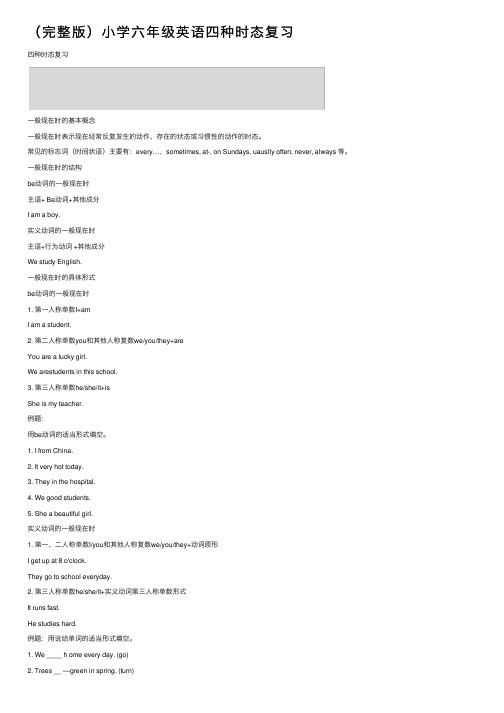
(完整版)⼩学六年级英语四种时态复习四种时态复习⼀般现在时的基本概念⼀般现在时表⽰现在经常反复发⽣的动作、存在的状态或习惯性的动作的时态。
常见的标志词(时间状语)主要有:every…,sometimes, at-, on Sundays, uauslly often, never, always 等。
⼀般现在时的结构be动词的⼀般现在时主语+ Be动词+其他成分I am a boy.实义动词的⼀般现在时主语+⾏为动词 +其他成分We study English.⼀般现在时的具体形式be动词的⼀般现在时1. 第⼀⼈称单数I+amI am a student.2. 第⼆⼈称单数you和其他⼈称复数we/you/they+areYou are a lucky girl.We arestudents in this school.3. 第三⼈称单数he/she/it+isShe is my teacher.例题:⽤be动词的适当形式填空。
1. I from China.2. It very hot today.3. They in the hospital.4. We good students.5. She a beautiful girl.实义动词的⼀般现在时1. 第⼀、⼆⼈称单数I/you和其他⼈称复数we/you/they+动词原形I get up at 8 o'clock.They go to school everyday.2. 第三⼈称单数he/she/it+实义动词第三⼈称单数形式It runs fast.He studies hard.例题:⽤说给单词的适当形式填空。
1. We ____ h ome every day. (go)2. Trees __ —green in spring. (turn)3. He ____ very hard. (study)4. The boy - ___ up at seven O'clock. (get)5. The earth ____ round the sun. (move)补充:主语为第三⼈称单数形式,谓语动词的变化规则:般现在时的句型变化 be 动词的⼀般现在时否定句主语 + be 动词 + not +其他He is not a worker.特殊疑问句特殊疑问词 + ⼀般疑问句Where is he?例题:写出下列句⼦中所缺的be 动词,并⽤肯定及否定形式回答。
六年级四大时态知识点归纳总结
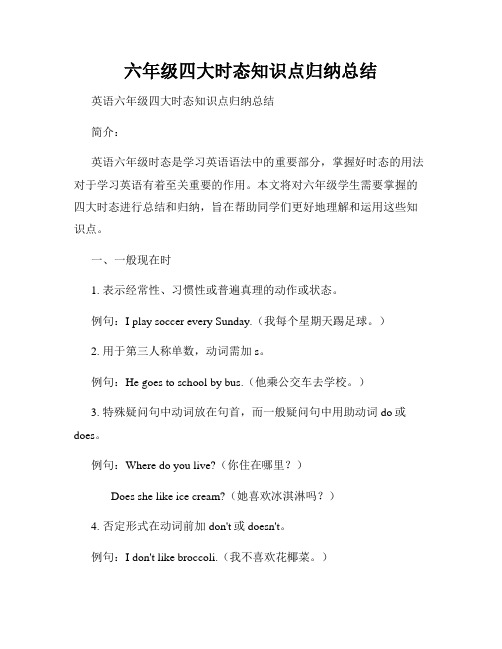
六年级四大时态知识点归纳总结英语六年级四大时态知识点归纳总结简介:英语六年级时态是学习英语语法中的重要部分,掌握好时态的用法对于学习英语有着至关重要的作用。
本文将对六年级学生需要掌握的四大时态进行总结和归纳,旨在帮助同学们更好地理解和运用这些知识点。
一、一般现在时1. 表示经常性、习惯性或普遍真理的动作或状态。
例句:I play soccer every Sunday.(我每个星期天踢足球。
)2. 用于第三人称单数,动词需加s。
例句:He goes to school by bus.(他乘公交车去学校。
)3. 特殊疑问句中动词放在句首,而一般疑问句中用助动词do或does。
例句:Where do you live?(你住在哪里?)Does she like ice cream?(她喜欢冰淇淋吗?)4. 否定形式在动词前加don't或doesn't。
例句:I don't like broccoli.(我不喜欢花椰菜。
)He doesn't play the guitar.(他不弹吉他。
)二、一般过去时1. 表示过去某个时间发生的动作或状态。
例句:I watched a movie yesterday.(我昨天看了一部电影。
)2. 动词过去式一般在动词后加-ed,但也有一些不规则动词。
例句:She ate an apple for breakfast.(她吃了一个苹果作早餐。
)3. 特殊疑问句和一般疑问句中用助动词did。
例句:What did you do yesterday?(昨天你做了什么?)Did they go to the park?(他们去公园了吗?)4. 否定形式在动词前加didn't。
例句:I didn't swim in the lake.(我没有在湖中游泳。
)They didn't finish their homework.(他们没有完成作业。
小学六年级复习时态汇总
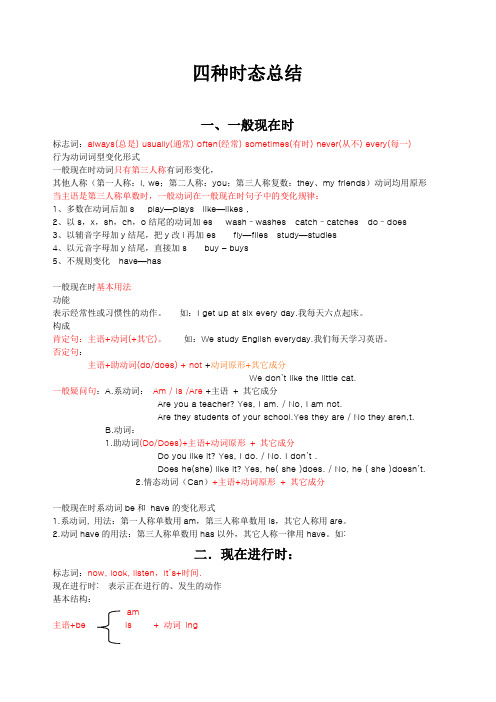
四种时态总结一、一般现在时标志词:always(总是) usually(通常) often(经常) sometimes(有时) never(从不) every(每一)行为动词词型变化形式一般现在时动词只有第三人称有词形变化,其他人称(第一人称:I, we;第二人称:you;第三人称复数:they、my friends)动词均用原形当主语是第三人称单数时,一般动词在一般现在时句子中的变化规律:1、多数在动词后加s play—plays like—likes ,2、以s,x,sh,ch,o结尾的动词加es wash–washes catch–catches do–does3、以辅音字母加y结尾,把y改i再加es fly—flies study—studies4、以元音字母加y结尾,直接加s buy – buys5、不规则变化have—has一般现在时基本用法功能表示经常性或习惯性的动作。
如:I get up at six every day.我每天六点起床。
构成肯定句:主语+动词(+其它)。
如:We study English everyday.我们每天学习英语。
否定句:主语+助动词(do/does) + not +动词原形+其它成分We don’t like the little cat.一般疑问句:A.系动词:Am / Is /Are +主语+ 其它成分Are you a teacher? Yes, I am. / No, I am not.Are they students of your school.Yes they are / No they aren,t.B.动词:1.助动词(Do/Does)+主语+动词原形+ 其它成分Do you like it? Yes, I do. / No. I don’t .Does he(she) like it? Yes, he( she )does. / No, he ( she )doesn’t.2.情态动词(Can)+主语+动词原形+ 其它成分一般现在时系动词be和have的变化形式1.系动词, 用法:第一人称单数用am,第三人称单数用is,其它人称用are。
六年级英语时态知识点总结
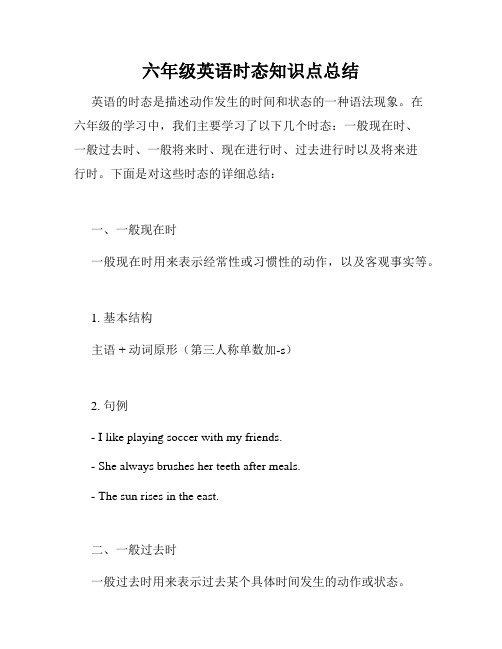
六年级英语时态知识点总结英语的时态是描述动作发生的时间和状态的一种语法现象。
在六年级的学习中,我们主要学习了以下几个时态:一般现在时、一般过去时、一般将来时、现在进行时、过去进行时以及将来进行时。
下面是对这些时态的详细总结:一、一般现在时一般现在时用来表示经常性或习惯性的动作,以及客观事实等。
1. 基本结构主语 + 动词原形(第三人称单数加-s)2. 句例- I like playing soccer with my friends.- She always brushes her teeth after meals.- The sun rises in the east.二、一般过去时一般过去时用来表示过去某个具体时间发生的动作或状态。
1. 基本结构主语 + 动词过去式2. 句例- Yesterday, I went to the zoo with my family.- We lived in a small village last year.- He finished his homework two hours ago.三、一般将来时一般将来时用来表示将来某个时间要发生的动作或存在的状态。
1. 基本结构主语 + will + 动词原形2. 句例- I will visit my grandparents this weekend.- They will have a party next month.- She will be a doctor when she grows up.四、现在进行时现在进行时用来表示现在正在进行的动作或暂时的状态。
1. 基本结构主语 + am/is/are + 动词 -ing2. 句例- They are playing basketball in the park now.- She is reading a book at the moment.- We are having dinner at a restaurant tonight.五、过去进行时过去进行时用来表示过去某个时间正在进行的动作。
六年级英语时态专项复习
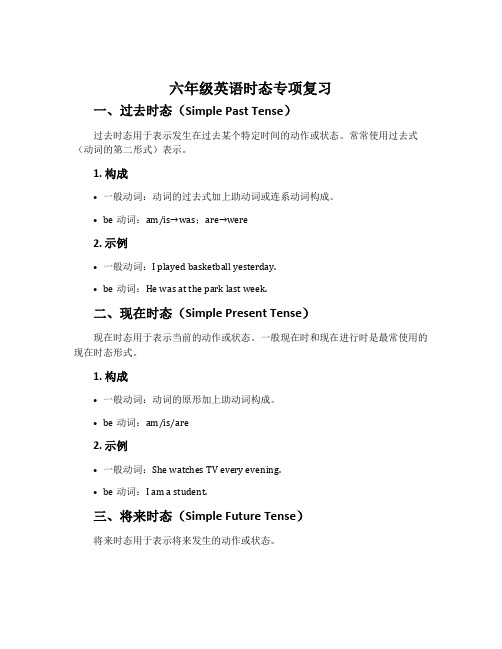
六年级英语时态专项复习一、过去时态(Simple Past Tense)过去时态用于表示发生在过去某个特定时间的动作或状态。
常常使用过去式(动词的第二形式)表示。
1. 构成•一般动词:动词的过去式加上助动词或连系动词构成。
•be动词:am/is→was;are→were2. 示例•一般动词:I played basketball yesterday.•be动词:He was at the park last week.二、现在时态(Simple Present Tense)现在时态用于表示当前的动作或状态。
一般现在时和现在进行时是最常使用的现在时态形式。
1. 构成•一般动词:动词的原形加上助动词构成。
•be动词:am/is/are2. 示例•一般动词:She watches TV every evening.•be动词:I am a student.三、将来时态(Simple Future Tense)将来时态用于表示将来发生的动作或状态。
•一般动词:will + 动词的原形构成。
•be动词:will be2. 示例•一般动词:I will visit my grandparents next week.•be动词:They will be at the party tomorrow.四、现在进行时(Present Continuous Tense)现在进行时用于表示现在正在进行的动作。
1. 构成•一般动词:am/is/are + 动词的现在分词构成。
2. 示例•一般动词:He is eating dinner right now.•be动词:They are playing football in the park.五、过去进行时(Past Continuous Tense)过去进行时用于表示过去某个时间正在进行的动作。
1. 构成•一般动词:was/were + 动词的现在分词构成。
2. 示例•一般动词:She was studying at the library last night.•be动词:They were sleeping when I called.六、现在完成时(Present Perfect Tense)现在完成时用于表示过去某个时间开始,一直延续到现在的动作或状态。
六年级英语时态综合复习

is playing 1、He____________ (play)basketball now. are going to plant 2、They________________(plant) trees next Monday. 3、He watches _______(watch)TV every evening.His read parents____(read) newspapers every day. climbed 4、Our classmates ________________(climb) mountains together last weekend.
六年级英语时态综合复习
主讲人:王佳佳
学 过 的 时 态
现在进行时 一般现在时 一般将来时
现场直播 日常生活
正在发生 常常发生
展望未来 还没发生 雁过留声 已经发生
一般过去时
(一)不同时态不同的句子结构:
主语+be doing(动词-ing形式) 现在进行时:
一般现在时: 第三人称单数主语+动词-s/-es形式
一般将来时
tomorrow / next day / this afternoon / next week(month year)
一般过去时
yesterday/last week(year month)
一般将来时
一般现在时
一般过去时
A always ,usually,often,sometimes, on the weekends,every day B yesterday,last week,last year C Look! Listen! now
Homework:
六年级上册英语时态归纳
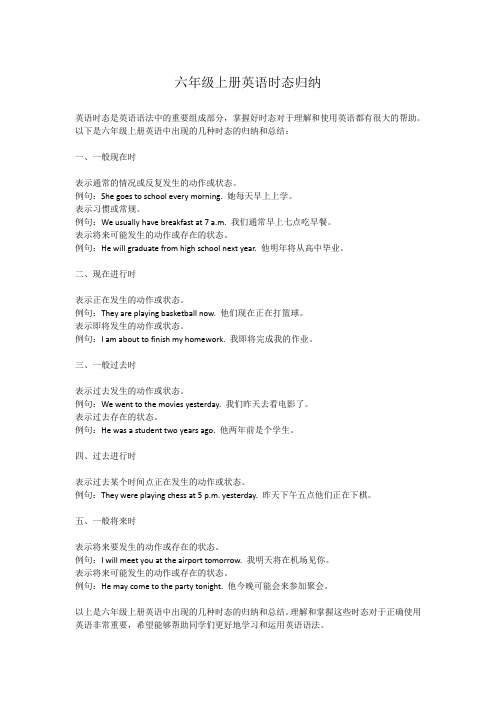
六年级上册英语时态归纳英语时态是英语语法中的重要组成部分,掌握好时态对于理解和使用英语都有很大的帮助。
以下是六年级上册英语中出现的几种时态的归纳和总结:一、一般现在时表示通常的情况或反复发生的动作或状态。
例句:She goes to school every morning. 她每天早上上学。
表示习惯或常规。
例句:We usually have breakfast at 7 a.m. 我们通常早上七点吃早餐。
表示将来可能发生的动作或存在的状态。
例句:He will graduate from high school next year. 他明年将从高中毕业。
二、现在进行时表示正在发生的动作或状态。
例句:They are playing basketball now. 他们现在正在打篮球。
表示即将发生的动作或状态。
例句:I am about to finish my homework. 我即将完成我的作业。
三、一般过去时表示过去发生的动作或状态。
例句:We went to the movies yesterday. 我们昨天去看电影了。
表示过去存在的状态。
例句:He was a student two years ago. 他两年前是个学生。
四、过去进行时表示过去某个时间点正在发生的动作或状态。
例句:They were playing chess at 5 p.m. yesterday. 昨天下午五点他们正在下棋。
五、一般将来时表示将来要发生的动作或存在的状态。
例句:I will meet you at the airport tomorrow. 我明天将在机场见你。
表示将来可能发生的动作或存在的状态。
例句:He may come to the party tonight. 他今晚可能会来参加聚会。
以上是六年级上册英语中出现的几种时态的归纳和总结。
理解和掌握这些时态对于正确使用英语非常重要,希望能够帮助同学们更好地学习和运用英语语法。
六年级英语语法复习:时态
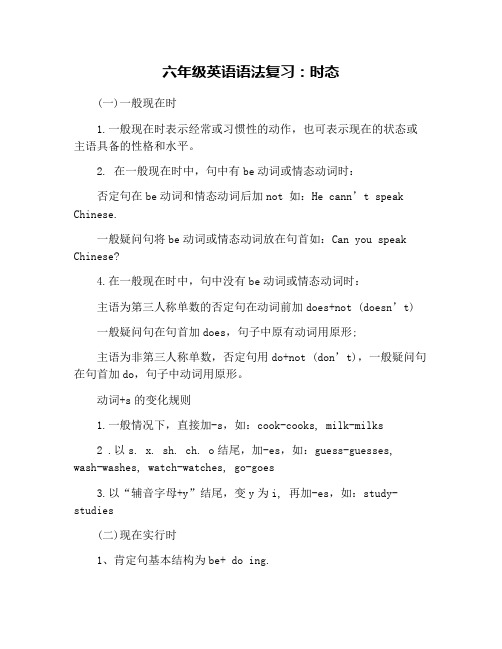
六年级英语语法复习:时态(一)一般现在时1.一般现在时表示经常或习惯性的动作,也可表示现在的状态或主语具备的性格和水平。
2. 在一般现在时中,句中有be动词或情态动词时:否定句在be动词和情态动词后加not 如:He cann’t speak Chinese.一般疑问句将be动词或情态动词放在句首如:Can you speak Chinese?4.在一般现在时中,句中没有be动词或情态动词时:主语为第三人称单数的否定句在动词前加does+not (doesn’t)一般疑问句在句首加does,句子中原有动词用原形;主语为非第三人称单数,否定句用do+not (don’t),一般疑问句在句首加do,句子中动词用原形。
动词+s的变化规则1.一般情况下,直接加-s,如:cook-cooks, milk-milks2 .以s. x. sh. ch. o结尾,加-es,如:guess-guesses, wash-washes, watch-watches, go-goes3.以“辅音字母+y”结尾,变y为i, 再加-es,如:study-studies(二)现在实行时1、肯定句基本结构为be+ do ing.否定句:be not doing.一般疑问句把be动词调到句首2、动词加ing的变化规则1.一般情况下,直接加ing,如:cook-cooking2.以不发音的e结尾,去e加ing,如:make-making, taste-tasting3.如果末尾是一个元音字母和一个辅音字母,双写末尾的辅音字母,再加ing,如:run-running, stop-stopping(三)be going to1.be going to 表示将要发生的事或打算、计划、决定要做的事情。
2.肯定句:be going to +动词原形,如:Jim is going to play football.否定句:be not going to +动词原形,如:Jim is not going to play football.一般疑问句:把be动词调到句首,如:Is Jim going to play football?特殊疑问句:疑问词+be+主语+going to+动词原形?如:What is Jim going to do?疑问词当主语时:疑问词+be+going to+动词原形?如:Who is going to play football?(四)一般过去时1.一般过去时表示过去某个时间发生的动作或存有的状态,常和表示过去的时间状语连用。
六年级英语时态练习二三
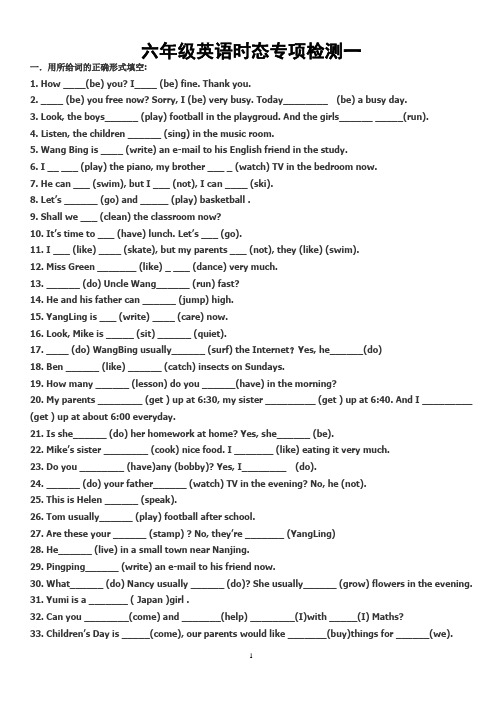
六年级英语时态专项检测一一.用所给词的正确形式填空:1. How ____(be) you? I____ (be) fine. Thank you.2. ____ (be) you free now? Sorry, I (be) very busy. Today________ (be) a busy day.3. Look, the boys______ (play) football in the playgroud. And the girls______ _____(run).4. Listen, the children ______ (sing) in the music room.5. Wang Bing is ____ (write) an e-mail to his English friend in the study.6. I __ ___ (play) the piano, my brother ___ _ (watch) TV in the bedroom now.7. He can ___ (swim), but I ___ (not), I can ____ (ski).8. Let’s ______ (go) and _____ (play) basketball .9. Shall we ___ (clean) the classroom now?10. It’s time to ___ (have) lunch. Let’s ___ (go).11. I ___ (like) ____ (skate), but my parents ___ (not), they (like) (swim).12. Miss Green _______ (like) _ ___ (dance) very much.13. ______ (do) Uncle Wang______ (run) fast?14. He and his father can ______ (jump) high.15. YangLing is ___ (write) ____ (care) now.16. Look, Mike is _____ (sit) ______ (quiet).17. ____ (do) WangBing usually______ (surf) the Internet?Yes, he______(do)18. Ben ______ (like) ______ (catch) insects on Sundays.19. How many ______ (lesson) do you ______(have) in the morning?20. My parents ________ (get ) up at 6:30, my sister _________ (get ) up at 6:40. And I _________ (get ) up at about 6:00 everyday.21. Is she______ (do) her homework at home? Yes, she______ (be).22. Mike’s sister ________ (cook) nice food. I _______ (like) eating it very much.23. Do you ________ (have)any (bobby)? Yes, I________ (do).24. ______ (do) your father______ (watch) TV in the evening? No, he (not).25. This is Helen ______ (speak).26. Tom usually______ (play) football after school.27. Are these your ______ (stamp) ? No, they’re _______ (YangLing)28. He______ (live) in a small town near Nanjing.29. Pingping______ (write) an e-mail to his friend now.30. What______ (do) Nancy usually ______ (do)? She usually______ (grow) flowers in the evening.31. Yumi is a _______ ( Japan )girl .32. Can you ________(come) and _______(help) ________(I)with _____(I) Maths?33. Children’s Day is _____(come), our parents would like _______(buy)things for ______(we).34. He is______ (write) an e-mail to his father.六年级英语时态专项检测二姓名_______________ 得分_______________35. I like______ (cook) and______ (grow) flowers.36. We______ (study) English, Chinese, Maths, Science and Art at school.37. I ____(be) late. Don’t ___ (be ) late again.38. Look, the bus ____________ (come).39. My father can ____ (ride) a horse.40. Look! ________your father __________ ( make) model ships over there?41. The students would like __________ (play )football after class.42. What can you _____ (do )? I can _____ (run). But I ________(skate ) now.43. What lessons _____(do ) you ____(have) in the morning? We____( have )four.44. I ______ (go ) to school by bus, and he ______(go) to school by bike.45. _______ she often _______ (write) to you ? Yes, she _______(do).46. Who ________ (sing) beautifully in your class? Jim.47. The _______ (butterfly ) are dancing in the flowers . I like __________ very much .48. Oh,There ____ (be) many pears in the box. _____ (be) they your pears? No, they _____49. _________ (be) you at home yesterday? No, I ___________.50. __________ your brother go shopping last night? No, he _________(do) his homework at home.51. My mother can’t __________(find) her glasses. They _________(be) in her bag just now.52. I __________ (not meet) Nancy just now. Listen, she ___________(sing) over there.53. Do you like ____________( picture)? No, I __________. I like ___________(doll).54. She shouldn’t _________(go) to the zoo now, she must __________(stay) at home.55. We want ___________(play) a game at the party.56. Ben ___________(watch) a film last weekend.57. Did you ____________(pick) oranges on the farm?58. What did you do on Sunday? I __________(water) flowers.59. The boy ____________(not pull) up carrots just now, he _________(cook) food.60. Were there any books on the desk? No, they ___________.61. I can __________(get) up early. I __________(do) morning exercise at six.62. She likes ___________(dance). She can dance very _________(good).63. What _______ he doing? He is __________(draw) pictures.64. ________ your birthday in June? No, it’s on the ________(five) of April.65. Where _________ (be) you just now? I _______(clean) my bedroom.。
- 1、下载文档前请自行甄别文档内容的完整性,平台不提供额外的编辑、内容补充、找答案等附加服务。
- 2、"仅部分预览"的文档,不可在线预览部分如存在完整性等问题,可反馈申请退款(可完整预览的文档不适用该条件!)。
- 3、如文档侵犯您的权益,请联系客服反馈,我们会尽快为您处理(人工客服工作时间:9:00-18:30)。
going
动词-s/-es形 式
has
does
studies
goes
动词过去式
had
did
studied
went
(三)每种时态常见的标志语
现在进行时Look! Listen! /now
is swimming (swim). 1、Look! She __________ are having 2、We _________ (have) English class now.
六年级英语 时态综合复习
\
学 过 的 时 态
现在进行时 一般现在时 一般将来时
现场直播 日常生活
正在发生 常常发生
展望未来 还没发生 雁过留声 已经发生
一般过去时
读一读,写一写。
日常活动:Sometimes I go to school on foot. She often goes to school by bike. 雁过留声:I washed my clothes last sunday. She watched TV yesterday. 现场直播:I am having an English class now. Look! they are listening to music. 展望未来I am going to Hangzhou tomorrow. He will visit his grandparnets next weekend .
一般现在时
always / usually / often / sometimes / on the weekends / every day(week...) 1.Sometimes he_____ has (have)lunch at school. go (go) to school on foot . 2.I often____
4.On Saturday morning, we often wash (wash) our clothes.
5.They
are going to see
(see) a film next week.
is playing 1、He____________ (play)basketball now. are going to plant 2、They________________(plant) trees next Monday. 3、He watches _______(watch)TV every evening.His read parents____(read) books every day. climbed 4、Our classmates ________________(climb) mountains together last weekend.
Homework:
复习四个时态,自由各写出两个表示时态的句子。
Thank you!
5、阅读小短文 take Hello,I am Yutao .I often _____(take) a trip.Sometimes I go with my parents . Sometimes I go with my classmates .Last year I went ____(go) to Hangzhou with my parents .We were all very happy .Look! I am eating _________(eat) the mooncake. I am studying ____________(study) hard now. I am going to work _______________(work) in the future( 将来)。
动词-ing形式(doing)
一般将来时: 动词原形(be going to+do) 一般过去式: 动词过去式(did)
现在进行时( A 一般将来时( D 一般过去时( B 一般现在时(C D
) ) ) )
A、动词-ing形式 B、动词过去式 C、动词-s/-es形式 D、动词原形
购物 go shopping
一般将来时
tomorrow / next day / this afternoon / next week(month/ year)
are going to take 1.They_____________(take) a trip next week. am going to do 2.I _____________(do)my homework tomorrow.
句子分析过程:
1、找标志语 2、确定时态 3、确定时态对应的句子结构 4、完整读句子
1.Look! She 2.Jack went summer.
is picking
(pick) up the fruit.
(go) to Xi’an last
has (have) lunch at
3.Sometimes he school.
一般过去时
yesterday/last week/last year/last month
went 1.Jack_________(go) to Being Jing last summer holiday. read 2.I________(read) a book yesterday.
一般将来时
(一)不同时态不同的句子结构:
现在进行时:主语+be doing(动词-ing形式)
I am having an English class now.
一般现在时: 1.第三人称单数主语(she/he/it)+动词-s/es形式 She has an English class on Mondays. 2.非第三人称单数主语(they\we)+动词原形 They have an English class on Mondays
1、The West Lake is beautiful .we are going to Hong Zhou___ B A、last summer holiday B、next summer holiday 2、He climbs mountains_____ A A、every week B、this weekend A 3、I am reading a book___ A、now B、this evening
动词过去式 动词-s/-es形式 I went shopping.
He goes shopping.
I’m going shopping. I’m going to go shopping.
动词-ing形式
动词原形
have
动词原形
do
study
go
动词-ing形式
havingຫໍສະໝຸດ doingstudying
一般现在时
一般过去时
A always ,usually,often,sometimes, on the weekends,every day B yesterday,last week,last year C Look! Listen! now
现在进行时
D tomorrow ,next day, this afternoon,next year
一般将来时:主语+be going to do(动词原形)
I am going to have an English class next Mondays
一般过去时: 主语+动词过去式
We had an English class yesterday.
(二)不同时态的不同动词形式
现在进行时: 一般现在时: 主语是第三人称单数时 主语是非第三人称单数时 动词-s/-es形式(does) 动词原形(do)
